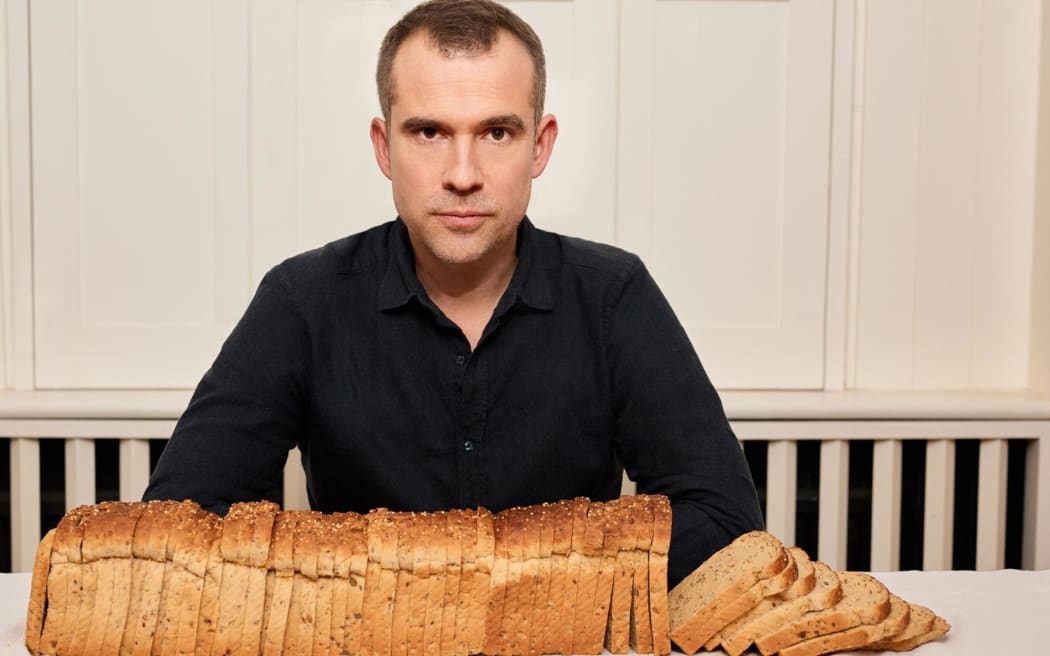If food is made by people who love you, then it nourishes you. The same can't be said of food made by transnational corporations answerable to hedge funds, says an academic and doctor with an interest in ultra processed food.
Dr Chris van Tulleken is an associate professor at University College in London and TV presenter.
His new book is called Ultra-Processed People: The Science Behind the Food That Isn't Food.

Dr Chris van Tulleken Photo: supplied
Every year, the average person eats about 8kg of additives, he says, most of which we know very little about.
The ubiquitous emulsifier is one such example, he told Jesse Mulligan.
“Synthetic emulsifiers act a bit like detergents, and they seem to scrub out the mucous lining of the gut, they seem to damage the microbiome, the friendly bugs that live inside us.
“So, there's growing evidence that emulsifiers lead to inflammation and seem to be associated with lots and lots of different poor health outcomes in humans and in animals.”
Ultra-processed food is causing what he terms commerciogenic disease.
“For a long time, we've thought of obesity as a problem that was to do with willpower, to do with individuals who are being slothful, and that is completely inaccurate.
“Obesity and diet-related disease have overtaken smoking as the leading cause of early death.
"And it's not because we've had some global failure of willpower or moral responsibility, it's because the food environment has changed.”
The way it has changed is that ultra-processed food is now globally our main source of calories, he says. This food is made by a small number of companies - fewer than 20 - who produce it not just for profit but for financial growth.
We're all part of a giant experiment that we didn't volunteer for, van Tulleken says.
“I was talking to a scientist in Brazil, and they kept saying, 'Chris, it's not food, these are industrially produced edible substances'.
“They really, really aren't food. Food is about nourishment, these products aren't.”
Clinical trials and epidemiology show this food is engineered to make us consume more of it, and it works, he says.
“Because guess what, if you eat it quicker and you eat more of it, the companies who make it make more money.
“I spoke to loads of people inside food companies who all confirmed this food is tested using focus groups. It's put through big panels of tasters. And the foods that people eat the quickest and the most of, they're the ones that end up on our shelves.”
Even if food companies wanted to produce healthier food they are stymied, he says.
“CEOs at Unilever, Pepsi, and Danone have all tried quite hard to make their portfolios healthier, and all of them have been sacked.
“Danone’s was sacked by activist investors, by hedge funds, because the share price fell. An analyst at Blackrock said to me these companies are not in charge of their business model.”
The big finance houses call the tunes, he says.
“The asset managers, the pension funds - Vanguard, BlackRock, Jupiter, these are the companies who demand money and this is kind of necessary.
"I mean, my pension is partly at Blackrock so, in a way I am part of the problem.”
The only solution is regulation, he says. But government advisory bodies around the world are stuffed with industry players.
“The food companies have gigantic influence over nutrition policy, the way we label food or the way we issue warnings.
“Our Scientific Advisory Committee on nutrition in the UK has 16 members. Fifteen of them have declared conflicts with the food and drink industry.
“The same is true of all our charities that advise on food policy, they're all funded by the food industry.”
We need to get them out of the room, he says.
“You cannot profit from causing a problem and at the same time be part of the solution - it can't be done.”
A sugar tax was raised in the most recent leaders' debate here in New Zealand, but van Tulleken isn’t a fan.
“We brought in a sugar tax in the UK, removed all the sugar from the diet. It was all replaced with artificial sweeteners, we know we got rid of the sugar and we know no one lost any weight, particularly kids.”
A better way is make real food cheaper and more available, he says, and properly label ultra-processed food.
“Take the cartoon characters off it, stop the ads to kids, and then have policies that improve affordability and accessibility to food and fight poverty.
“What we know is that if you have money, you don't eat this food. Rich people - celebrities, international sports stars - they don't eat any of this. They market it, they take money from the companies but they never eat it.”
Once people know food is harmful, and they can afford real food, they make smart choices, he says, citing studies in South and Central America.
But he acknowledges real food is expensive and so is the time and equipment needed to cook it.
“The difficulty in the UK with fruit and veg is not just that they are absolutely more expensive, and they are incredibly expensive here.
“They also don't keep, you need equipment, knives, chopping boards, stoves. You also need time and time is incredibly expensive and then to batch cook a lasagne from fresh ingredients you need to freeze some of it to make it economical, and you need to cook it, also using energy that's also expensive.”
Nevertheless, his advice is to get cooking at home if you possibly can and stay well away from ultra-processed food.
“Every single human traditional diet ever studied comes with health benefits, whether it's East Asian food that's mainly fish, South Asian vegan food or Mediterranean foods.
“It's all brilliant for you, just get out a cookbook and start cooking - it's all healthy.”

